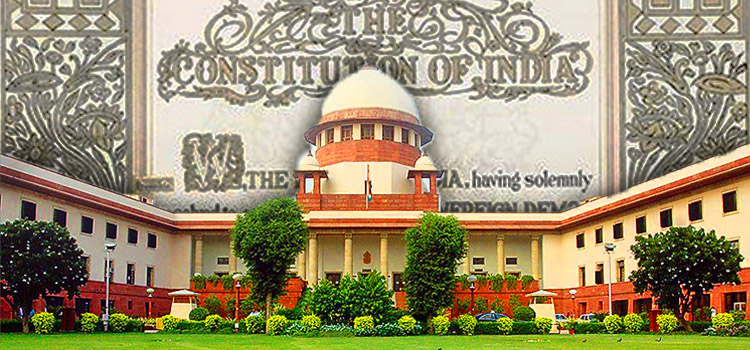Writs under the Indian Constitution
Posted On : November 7, 2022

Table of Contents
In the words of Dicey, prerogative writs are “the bulwark of English Liberty”. The expression ‘prerogative writ is one of English common law which refers to the extraordinary writs granted by the sovereign, as a fountain of justice on the ground of inadequacy of original legal remedies. In the course of time, these writs were issued by the high court as extraordinary remedies in cases where there was either no remedy available under the ordinary law or the remedy available was inadequate. Under the Constitution by the merits of Article 226, every High Court has the power to issue directions or orders or writs in the nature of Habeas Corpus, Mandamus, Prohibition, Quo warranto and Certiorari or any of them For the enforcement of fundamental rights stipulated in Part III of the Constitution or for any other purpose. This power is exercisable by all the High Courts of India throughout the territory, in relation to which it exercises jurisdiction. Where a constructive remedy is available, the high court should not readily take into consideration a petition under Article 226 of the Constitution of India.
Writs in the Apex Court
The Supreme Court could be moved by appropriate proceedings for the issue of directions are orders or writs, as referred to under Article 226 for the enforcement of the rights guaranteed by Part III of the Constitution. Article 32 itself be in a fundamental right, the constitutional remedy of writ is available to anyone whose fundamental rights are infringed by State action. Thus, we see the power of high courts to issue these writs is wider than that of the Supreme Court. Whereas:
a) An application to a high court under Article 226 will lie not only be some other limitation imposed by the constitution, outside Part III, has been violated, but, an application under article 32 shall not lie in any case unless the right infringed is a fundamental right and enumerated in Part III of the constitution;
b) While the supreme court can issue a writ against any person or government within the territory of India, a High Court can under article 226 issue a writ against any person, government or other authority only if such person or authority is physically resident or located within a territorial jurisdiction of the particular High Court extends or if the cause of action arises within such jurisdiction.
As stated earlier, the Supreme Court has been assigned by the constitution a special role as the “protector and guarantor of fundamental rights” by article 32 (1). Although the constitution has provided for concurrent writ jurisdiction of the high courts it is not necessary, that an aggrieved petitioner should first apply to the High Court and then the Supreme Court. The jurisdiction of the high court also extends to the enforcement of rights other than fundamental rights provided there is a public duty. The Supreme Court’s jurisdiction to issue writs extends to all types of fundamental rights.
Types of Writs
1. Habeas Corpus
2. Mandamus
3. Certiorari
4. Prohibition
5. Quo warranto
Habeas Corpus
The writ of Habeas Corpus, an effective bulwark of personal liberty - is a remedy available to a person who is confined without legal justification. The words ‘Habeas Corpus’ literally means “to have the body”. When a prima facie case for the issue of it has been made in the court issues a rule nisi upon the relevant authority to show cause why the writ should not be issued. This is in national order to let the court know on what grounds he has been confined and to set him free if there is no justification for his detention. This writ has to be accepted by the detaining authority by producing the person before the court. Under articles 32 and 226 any person can move for this to the Supreme Court and high court respectively. The applicant may be the prisoner or any person acting on his behalf to safeguard his Liberty for the issuance of the rate of Habeas Corpus as no man can be punished or deprived of his personal liberty except for violation of law and in the ordinary legal manner.
Mandamus
The word Mandamus means “we command”. The writ of mandamus is a command issued to direct any person, corporation, inferior court or government requiring him or its office to do a particular thing specified therein which pertains to his or its office and is further in the nature of public duty. This writ is used when the inferior tribunal has declined to exercise jurisdiction while resorting to certiorari and prohibition arises when the Tribunal has wrongly exercised jurisdiction or exceeded its jurisdiction and is available only against judicial and quasi-judicial bodies.
Certiorari
It is available to any person, wherever anybody of persons having legal authority to determine questions affecting the rights of subjects and having the duty to act judicially in excess of their legal authority. This writ removes the proceedings from such body to the High Court, to quash a decision that goes beyond its jurisdiction. Under the Constitution of India, all High Courts can issue the writ of certiorari throughout their territorial jurisdiction when the subordinate judicial authority acts
- Without or in excess of jurisdiction.
- Contravention of the rules of principles of natural justice.
- Commits and error apparent on the face of the record.
The jurisdiction of the Supreme Court to issue such writs arises under Article 32. Although the object of both the writs of prohibition and of certiorari is the same, prohibition is available at an earlier stage where as certiorari is available at a later stage but in similar grounds.
Prohibition
The writ of prohibition is issued to an Inferior Court preventing the latter from usurping jurisdiction which is not legally vested in it. When a Tribunal acts without or in excess of Jurisdiction or in violation of rules or law, a writ of prohibition can be asked for. It is generally should before the trial of the case. While mandamus commands activity, prohibition commands inactivity, it is available only against judicial or quasi-judicial authorities and is not available against a public officer who is not vested with judicial functions. If abuse of power is apparent this writ maybe a matter of right and not a matter of discretion.
Quo Warranto
The writ of quo warranto enables enquiry into the legality of the claim that a person asserts, to an office or franchise and to oust him from such position if he is a usurper. The holder of the office has to show the court under what authority he holds the office. It is issued when:
- The office is of a public and of substantive nature,
- Created by statute or by the constitution itself, and
- The respondent has asserted his claim to the office it can be issued even though he has not assumed the charge of the office.
The fundamental basis of the proceeding of Quo warranto is that the public has the interest to see that an unlawful claimant does not usurp a public office. It is a discretionary remedy that the court may grant or refuse.





















